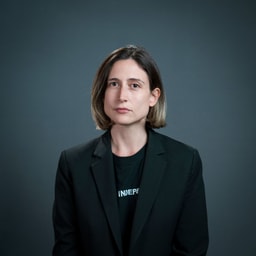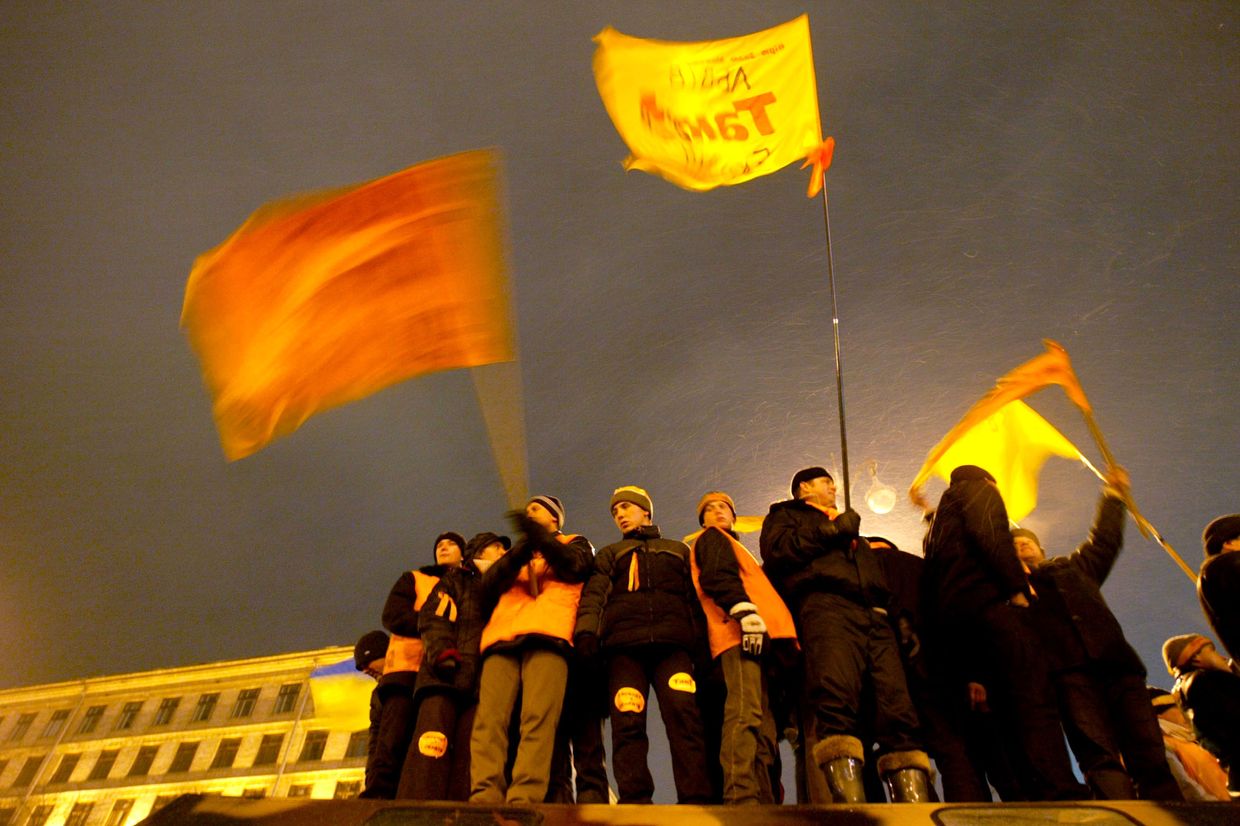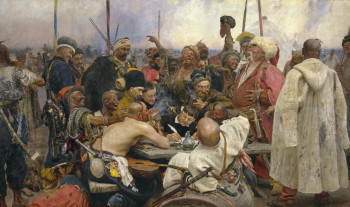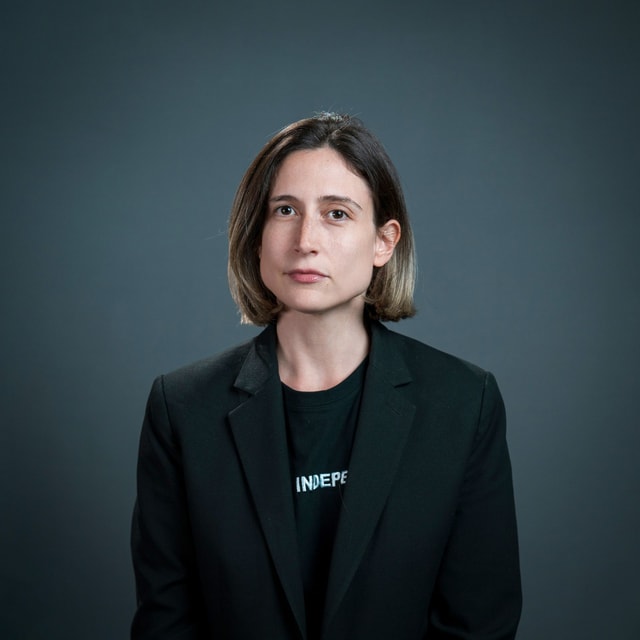The Orange Revolution was a series of massive protests in Ukraine from late November 2004 to January 2005, triggered by widespread electoral fraud in the 2004 presidential election. (The Kyiv Independent)
Ukraine’s Orange Revolution was a series of protests, held mostly in Kyiv, that lasted from November 2004 to January 2005 as a response to election fraud.
After reports that the results of the Nov. 21, 2004, presidential election run-off between ex-Prime Minister Viktor Yushchenko and then Prime Minister Viktor Yanukovych had been rigged, favoring the latter, mass protests swelled in Kyiv’s downtown Independent Square as well as in other cities around the country.
Within days, an estimated 500,000 protestors gathered in downtown Kyiv, waving orange flags and wearing orange clothing, the chosen color of Yushchenko’s campaign and the subsequent revolution.

Shortly after the revolution began, a tent city appeared on Independence Square, known as Maidan. Ukrainian musicians performed and celebrities made appearances. While riot police were deployed to Kyiv’s central streets, the protests were largely peaceful and the police didn’t use force.
In early December, Ukraine’s Supreme Court ruled that the level of fraud had rendered the election results null and void making it impossible to determine the winner, thus forcing a revote.
Yushchenko’s ultimate victory and inauguration the following January concluded the revolution.
What sparked the revolution?
Election fraud sparked mass protests all across Ukraine.
According to exit polls, pro-Western candidate Yushchenko received a commanding 52% of the popular vote. Moscow-backed Yanukovych received only 43%. But when the official results came in, Yanukovych had apparently won the run-off a vote by 2.5%.
In the eastern part of the country, Ukraine’s Donbas region from where Yanukovych hailed, voter turnout suddenly jumped, differing drastically from what exit polls had recorded. Independent election monitors began sounding the alarms about widespread election fraud and voter tampering.
But as is the case with any revolution, the election fraud was simply the last straw. Yanukovych and his circle’s ties to Russian political and criminal groups were well known.
It became clear early on in the campaign that then-President Leonid Kuchma and his favored successor, then-Prime Minister Yanukovych, would possibly try to rig the election.

Yushchenko, who was seen as a beacon of hope by many Ukrainians, faced constant political harassment. His campaign was the victim of a barrage of negative press on government-controlled television.
Yushchenko was almost killed on Sept. 6, 2004, when he became severely ill and suffered scarring on his face. It was later revealed that he had suffered from dioxin poisoning.
When the election was rigged, the public was ripe to react, having witnessed the corrupt political elite's attempts to stop the Yushchenko campaign for months.
Why was the revolution successful?
People wanted change, and the widespread and obvious support for Yushchenko made it impossible to stop the revolution without the use of force. President Kuchma decided to restrain from doing so.
Many in Ukraine had grown impatient with widespread corruption and slow economic growth at the time. Civil society groups had started sprouting up quickly and organizing all over the country.
The assassination of Georgiy Gongadze, a Ukrainian journalist and the founder of Ukrainska Pravda, in 2000 sparked widespread outrage. An audiotape was published in which a man, alleged to be Kuchma, ordered his allies to “deal with Gongadze.”
Kuchma’s reputation was tarnished, while the civil society groups who had coalesced in part around opposition to Kuchma’s presidency had the networks to create the foundation for widespread public opposition to the incumbent regime.

Ukraine’s Orange Revolution also represented political visions and goals that went beyond free and fair elections. One of the main visions for a better future for Ukraine that figured in the revolution was Ukraine’s “European choice,” reflected in the slogans during the revolution and writings of leading writers and public intellectuals at the time.
Young people in Ukraine, born in the 80s and growing up in the 90s looked westward for culture, music, and freedom, including intellectual freedom, Taras Kuzio, a political expert on Ukraine noted at the time.
These young people had begun traveling to the West as tourists and students and had a negative view of the authorities, who were leaning towards closer ties with an increasingly autocratic Russia, according to Kuzio.
It was the politically motivated and western-leaning youth who provided the foot soldiers for the revolution and a pro-European civic nationalism.
Observers at the time also noted that the symbol of Europe was a major mobilizing force for Ukraine’s civil society. If at the mass level in Ukraine at the time, eastern-leaning, pro-Russian views existed, they proved difficult to use to bring people together, while Ukrainians that leaned toward a pro-European national identity were easier to mobilize, Kuzio wrote of the political landscape of the time.
The youthful atmosphere among civil society and present at the Orange Revolution no doubt would also have been a more attractive proposition to many. Yanukovych, with his ties to Russia and criminal interests, was the antithesis of these proposals.
What was the revolution fighting for?
While it is often said that Ukraine’s Euromaidan Revolution in 2014 was the moment that put Ukraine on the map, the world’s major news organizations followed the Orange Revolution’s developments closely. It was a major political event in post-communist and post-Soviet history and the world was gripped by a country known as corrupt standing up to the authorities.

Media reports about the Orange Revolution, however, had a tendency to cast the revolution as a battle between Ukrainian-speaking, pro-European Ukrainians, and Russian-speaking eastern Ukrainians. Writer and social commentator Oksana Zabuzhko pointed out in 2004 in an op-ed how “eagerly the Western press buys the made-in Russia political analysis of the current Ukrainian situation – the version that says Ukraine is “split into East and West.”
Indeed, those inside and outside of Ukraine who favored Yanukovych were largely Russian speaking. Yanukovych’s party was from Ukraine’s eastern Donetsk and the political and economic ties the party had with Russia, even Putin himself was no secret. But this rendering of events largely obscured the larger goals of the Orange Revolution to build a freer, fairer, more European Ukraine.
The story which narrates the events of late 2004 as a Ukrainian-Russian divide fails to understand, as Zabuzhko wrote, that Yanukovych was “perceived not so much as being ‘pro-Russian,’ but as, first and foremost, being ‘pro-criminal’ — a Ukrainian Al Capone, who has under his belt two prison sentences for robbery and assault.” To Zabuzhko, voting for Yushchenko was not simply Ukraine’s European choice, but its chance “to slay the Ukrainian part of that old, corrupt, Soviet-era dragon on Sunday at the polls.”
The values among the authorities at the time, authoritarian and criminal, were precisely the opposite of what the Orange Revolution demanded: democracy, freedom, and respect for citizens and their rights. It was these two visions for the present and future that collided.
What was the revolution’s legacy?
Yuri Andrukhovych, writer and essayist, said in a speech to the European Parliament in December 2004 that Yushchenko’s ultimate victory was “also a victory of Europe as an ethical system of value.”
Immediately following the revolution it appeared real change was on the horizon, not just in Ukraine, but in the larger post-Soviet space. Soon after his inauguration in January 2005, Yushchenko signed a joint declaration with then-president of Georgia Mikheil Saakashvili, saying at the time that the two countries were “shaping the new wave of liberty in Europe."
Nonetheless, the Orange Revolution is largely considered to have failed to bring about meaningful change and reforms in society. Yushchenko’s presidency was marred by scandals and political dismissals.
In the 2010 elections, he was unable to garner enough support to even make it to the run-off elections, and his former political rival Viktor Yanukovych capitalized on Yushchenko’s failures and people’s discontent with the lack of results after the Orange Revolution to win the presidency.




















